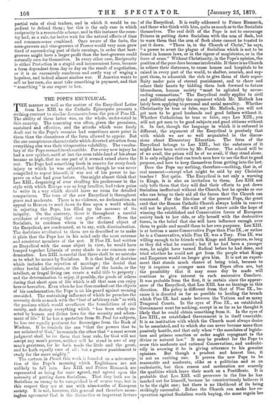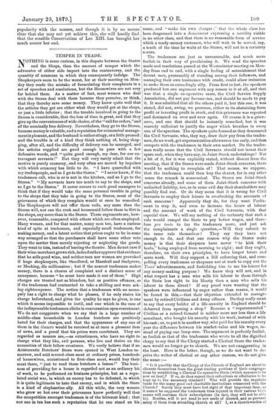THE POPE'S ENCYCLICAL. T HE manner as well as the matter
of the Encyclical Letter from Leo XIII. to the Catholic Episcopate presents a striking contrast to similar documents from the pen of Pius IX.
The ability of these latter was, on the whole, under-rated in this country. The reasoning was often given the premisses, sustained and effective, and the attacks which were freely dealt out to the Pope's enemies had sometimes more point in them than the clumsiness of the form allowed to appear. But the one conspicuous characteristic which diverted attention from everything else was their vituperative volubility. The vocabu- lary of the Pope seemed inexhaustible. For every new injury he had a new epithet, until at last the even table-land of his abuse became so high, that no one part of it seemed raised above the rest. The Pope had something fresh in reserve for every fresh injury to which he was subjected, but though he was never compelled to repeat himself, it was out of his power to im- prove on what had gone before. One might almost think that Leo XIII., despairing of ever rivalling his predecessor in the style with which Europe was so long familiar, had taken pains to write in a way which shculd leave no room for detailed comparisons. The tone of the new Encyclical is throughout grave and moderate. There is no violence, no declamation, no appeal to Heaven to send down its fires upon a world which, in rejecting the Pope, has filled up the measure of its iniquity. On the contrary, there is throughout a careful avoidance of everything that can give offence. Even the Socialists, to condemn whom is the declared object of the Encyclical, are condemned, so to say, with discrimination. The doctrines attributed to them are so described as to make it plain that the Pope has in his mind only the most extreme and consistent members of the sect. If Pius IX. had written an Encyclical with the same object in view, he would have lumped together Liberals of every shade in one common con- {lemnation. Leo XIII. is careful that there shall be no mistake as to what he means by Socialism. It is that body of doctrine which includes the rejection of marriage' the denial that either lawful inheritance, or the labour of the hands, or the intellect, or frugal living can create a valid title to property ; and the determination to enjoy, if possible, the goods of others during that short span of life which is all that man can enjoy here or hereafter. Even when he has thus marked out the objects of his condemnation, the Pope is on his guard against seeming one-sided. The restraining influence of which he preaches the necessity deals as much with the "lust of arbitrary rule" as with the passions which would overthrow the foundations of civil society, and. destroy everything which "has been wisely en- acted by human and divine laws for the security and adorn- ment of life." If he has a quotation from St. Paul for subjects, he has one equally pertinent for Sovereigns from the Book of Wisdom. If he reminds the one "that the powers that be are ordained of God," he reminds the other that "a most severe judgment shall be for them that bear rule, for God will not accept any man's person, neither will he stand in awe of any man's greatness, for he hath made the little and the great, and he hath equally care of all ; but a greater punishment is ready for the more mighty."
The cartoon in Punch this week is founded on a misconcep- tion of the Pope's meaning which Englishmen are not unlikely to fail into. Leo XIII. and Prince Bismarck are represented as being for once agreed, and agreed upon the necessity of putting down Socialism. That they both see in Socialism an enemy to be vanquished is of course true, but in this respect they are at one with nine-tenths of European society. It is not, however, this general and therefore mean- ingless agreement that is the distinctive or important feature of the Encyclical It is really addressed to Prince Bismarck, and those who think with him, quite as much as to the Socialists themselves. The real drift of the Pope is not to encourage Princes in putting down Socialism with the arm of flesh, but to warn them that the arm of flesh alone cannot be trusted to put it down. "There is, in the Church of Christ," he says, "a power to avert the plague of Socialism which is not to be found in human laws, or in the rigour of magistrates, or in the force of arms." Without Christianity, in the Pope's opinion, the position of the poor does become intolerable. If there is no Church to relieve their distresses, to cause homes and hospitals to be raised in every part of the world, to shelter, nourish, and sup- port them, to admonish the rich to give them of their super- fluity under pain of eternal punishment, and to cheer and solace their hearts by bidding them look forward to future blessedness, human society "must be agitated by never- ending commotions." The Encyclical really applies to civil and political morality the argument which Mr. Mallock has lately been applying to personal and social morality. Whether Christianity be true or false, says Mr. Mallock, you will not get men to be good husbands and good fathers without it. Whether Catholicism be true or false, says Leo XIII., you will not get men to be good subjects and good citizens without it. In fact, though the language in which it is enforced is different, the argument of the Encyclical is precisely that with which we are so well acquainted in the discus- sions about Elementary Education. The form of the Encyclical belongs to Leo XIII., but the substance of it might have been written by Mr. Forster. The school will be of no avail, the prison will be of no avail, if they stand alone. It is only religion that can teach men how to use the first to good purpose, and how to keep themselves from getting into the last.
Does the Pope say nothing, therefore—nothing, that is, of real moment—except what might be said by any Christian teacher ? Not quite. The Encyclical is not only a warning to Kings, it is also an invitation to them. Leo XIII. not only tells them that they will find their efforts to put down Socialism ineffectual without the Church, but he speaks as one who can bring to their aid all the forces that tIze Church can command. For the life-time of the present Pope, the great card that the Roman Catholic Church always holds in reserve will not be played. She will not yet throw aside the hope of winning the established and Conservative forces of European society back to her side, or ally herself with the destructive forces, in the belief that she will have influence enough over them to guide and mould them to her own purposes. Leo XIII. is at bottom a more Conservative Pope than Pius IX., or rather he is a Conservative, while Pius IX. was a Tory. Pius IX. was willing enough to be friends with Kings and Emperors, so long as they did what he wanted ; but if he had been a younger man, he might have turned Radical before he had done, and tried whether he could not get from the people what Kings and Emperors would no longer give him. It is not an experi- ment that stands much chance of being tried, because to try it requires a younger man than Popes often are, but the possibility that it may some day be made will continue to give interest to each successive Conclave. It was probable from the first, it is certain since the appear- ance of the Encyclical, that Leo XIII. has no leanings in this direction. His policy is different from that of Pius IX., be- cause it is directed as far as possible to healing the breach which Pius IX. had made between the Vatican and so many Temporal Courts. In the eyes of Pius IX., an established Government went for nothing, except in so far as he thought it likely that he could obtain something from it. In the eyes of Leo TETI., an established Government is in itself venerable. It is an institution with which the Church must always desire to be associated, and to which she can never become more than passively hostile, and that only when "the mandates of legisla- tors and princes sanction or order aught repugnant to the divine or natural law." It may be prudent for the Pope to avow this moderate and rational Conservatism, and undoubt- edly in avowing it he is giving utterance to his genuine opinions. But though a prudent and honest line, it is not an exciting one. It proves the new Pope to be reasonable and moderate, alike as a politician and as an ecclesiastic, but then reason and moderation are scarcely the qualities which leave their mark on a Pontificate. It is probable that Leo XIII. will persevere in the line he has marked out for himself, because he conscientiously believes it to be the right one ; but there is no likelihood of its being strikingly successful. Before the Church can make her co- operation against Socialism worth buying, she must regain her
popularity with the masses, and though it is by no means clear that she may not yet achieve this, she will hardly find that the sensible Conservatism of Leo XIII. has brought her much nearer her end.



































 Previous page
Previous page